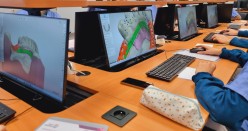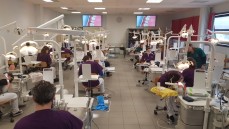Target level of study
Master's degree
Duration
6 years
Training structure
School of Dentistry
Language(s) of instruction
French
Presentation
- Studies for the Doctorate in Dental Surgery last six years.
- A Doctor of Dental Surgery is a practitioner who treats diseases of the oral cavity.
The advantages of the training program
Objectives
Adental surgeonis a medical professional authorized to practice dentistry, also known as oral medicine ordental surgery.
During the program, students will acquire:
- general knowledge about patients, the various conditions they may present with, and more specifically those affecting the orofacial region,
- both theoretical and practical training in areas as varied as the diagnosis, prevention, and treatment of oral diseases,
- specific knowledge that will enable them to pursue further training or even a career as a teacher-researcher, if they so wish.
Know-how and skills
The first cycle of studies provides an introduction to the profession of dental surgeon, both in general terms, combining the medical approach to the patient, the professional environment, ethics, professional conduct, and the patient-practitioner relationship, and in specific terms, relating to the oral ecosystem, the structures of the oral cavity and their pathologies, and the materials used in dentistry. This first cycle also includes an Introduction to Research course + an internship in a prosthetics laboratory.
Students undertake observation placements in hospital departments providing dental consultations and care, under the supervision of a tutor, enabling them to acquire their first clinical skills through contact with patients. They are also involved in the activities of the Health Service.
Thesecond cycle of studies focuses on professional practice while continuing to deepen knowledge in the various disciplines of dentistry, with progressive learning of complex treatments (prosthetic rehabilitation, oral surgery and oral medicine, periodontology, implantology, traumatology, dentofacial orthopedics, restorative dentistry, endodontics), and dental care for children or patients with special needs.
Program
Select a program
undergraduate
GENERAL TRAINING DIPLOMAS IN DENTAL SCIENCES 2ND AND 3RD YEAR
The DFGSO 2 and DFGSO 3 courses provide an introduction to oral practice and techniques. They include theoretical training and practical work on simulators, enabling students to learn the procedures they will later perform on patients. Foreign language and epidemiology courses complete this training.
The thematic guidelines for DFGSO 2 and DFGSO 3 are grouped into five disciplinary areas, broken down into teaching units:
- Section 1: embryology, developmental biology, histology, microbiology, parasitology, virology, general immunology, hematology, biochemistry, pharmacology and major classes of drugs, digital skills.
- Section 2: Head and neck anatomy, dental morphology, cervico-cephalic anatomy, oral physiology, oxyology, occlusodontics, medical imaging, patient radiation protection, biomaterials.
- Section 3: Semiology, semioradiology, multidisciplinary approach, oral surgery and oral medicine, periodontology, and first aid techniques.
- Section 4: Prosthetic dentistry, practical teaching of prosthetic dentistry, restorative dentistry – endodontics, practical teaching of restorative dentistry – endodontics.
- Section 5: orthodontics, pediatric dentistry, public health.
graduate school
ADVANCED TRAINING DIPLOMA IN DENTAL SCIENCES 4TH AND 5TH YEAR
During these two years, students obtain the status of dental externs. They complete internships in dental care centers and participate in hospital duties.
At the end of the fifth year, students take the clinical and therapeutic synthesis certificate exam. This certificate allows them to prescribe medications and health products, replace dental surgeons during their vacations, or work as a dental surgeon's assistant as a student assistant.
Short or long postgraduate program (DES) specialization
SHORT POSTGRADUATE TRAINING DIPLOMA (6TH YEAR)
The sixth year of study corresponds to a short postgraduate program (DFTCC). It focuses on a holistic approach to patient care and preparation for independent practice. At the end of this program, students must enroll in a thesis year and may defend their thesis between October and the end of June, or between September and the end of October.
Admission
Admission requirements
- Admission via the PASS or LAS or direct admission procedure (known as passerelles)
- PASS program => Specific "health access" program with an option to study another subject (e.g., law, biology, languages, etc.). These programs are organized in universities with health faculties.
- LAS program => A bachelor's degree with a "health access" option. These are offered by a range of universities, including those without a health faculty.



